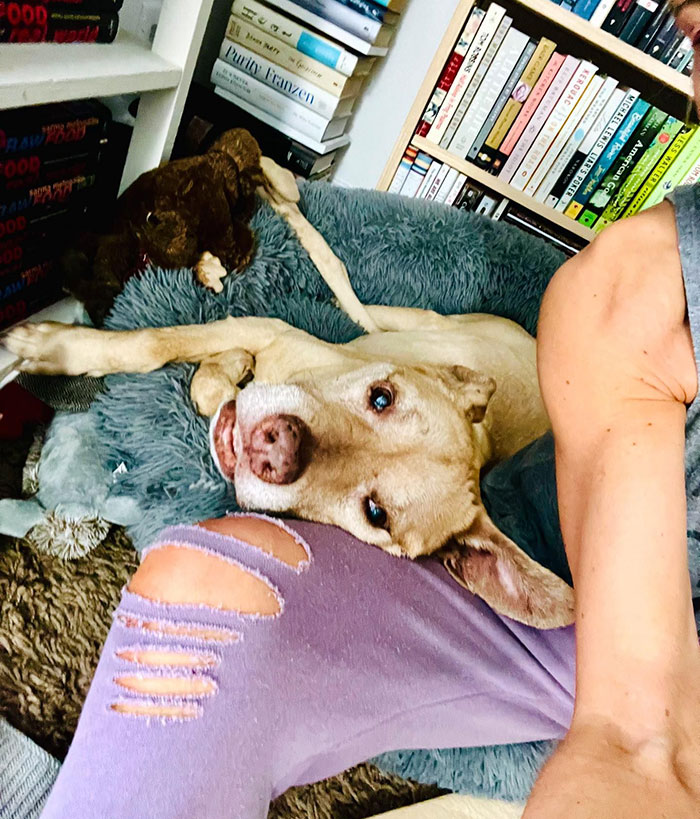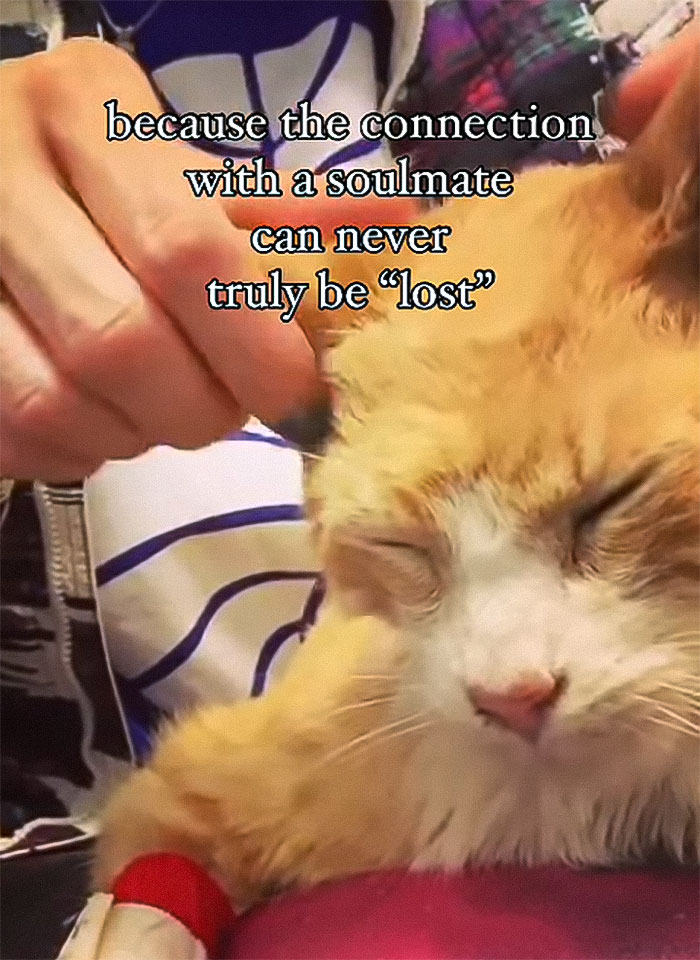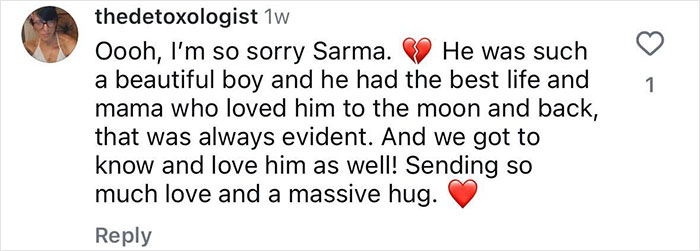Back in 2022, former New York City raw vegan restaurateur Sarma Melngailis rocked the post-Covid world when Netflix released the true-crime docuseries Bad Vegan. The four-episode show centered on how the chef became manipulated that her beloved rescue pitbull Leon would be immortal if she kept siphoning money from her savings and restaurant earnings to her con-artist husband, Anthony Strangis, AKA “Shane Fox.”
Fast forward to July 6, Sarma broke the heart-wrenching news that Leon had passed away of old age. “It’s happened. Time for this dreaded post about losing my best boy,” the 56-year-old wrote on Instagram.
The emotional tribute on social media, which included photographs of her last moments with her four-legged best friend, followed a candid blog post detailing Sarma’s journey of navigating her bereavement
“I’m heartbroken, but it was expected, a known part of agreeing to become the caretaker and guardian of one of these beautiful beings,” she wrote on July 5. “The final price we pay. I saw somewhere (probably on Instagram) that the only time our pets ever hurt us is when they pass away. True.”
Sarma Melngailis, notable for seeking immortality for her beloved rescue pitbull Leon, announced his passing

Leon occupied a significant part of the One Lucky Duck co-founder’s life, frequently featured on her social media and often discussed on Bad Vegan.
Nevertheless, Sarma has been doing “all right,” telling Bored Panda in an email on July 11: “I think because Leon was as old as he was and had slowed down so much, it’s not as devastating as if it had been sudden and unexpected.”
The vanilla-colored pooch drew his last breath at the age of 14 in the presence of his dog mommy, as Sarma described on her blog: “I didn’t sense he was in pain so much, but rather a sort of desperate breathing…
“I urgently repeated my I love you’s through sobs and finally he arched his head back and took a final gasp and then released and relaxed and I knew he’d left.”

Despite the remarkable length of his life — dogs typically live until the age of 13, although this expectancy greatly varies from breed to breed — Sarma was still confronted with the disbelief of losing her furry companion.
“I wasn’t expecting it so soon,” the ex-owner of Pure Food and Wine told Bored Panda. “I’m really busy with work-related things, so I’m preoccupied, which is good on the one hand, but I’d prefer more time to grieve and process.”
Sarma openly admitted she would usually cry in the mornings and at night before going to bed.
She further revealed: “I won’t adopt another dog, probably not for a long time and until my life is very different, where I have more resources to care for one and more support.”
The businesswoman concluded: “I find myself talking to him still as if he’s around. It feels that way.”
Sarma, whose past ordeal was depicted on Netflix’s Bad Vegan, candidly opened up about pet grief
Sarma’s pain is all too relatable for animal lovers who have adopted a pet as an additional family member.
Yet, such anguish can be isolating in a world where many don’t understand the deep bond between humans and their pets and where support systems often overlook this unique type of grief.
It’s this exact lack of resources that prompted certified pet grief therapists and specialists to offer their expertise.
Julie Wood, who runs Pet Grief Expert based in Saltburn, UK, discovered throughout her hypnotherapist career that many of her clients’ mental issues started after the death of a pet.
“Clients often worry that they are grieving more for their pet than they would for a relative,” Julie told Bored Panda in an email. “When I ask how often they saw the relative, they might say something like once a month, then I ask them how often they saw their pet, and usually, it was at least [in the] morning and evening every day.”
All dogs go to heaven 🥺
Rest in peace to the legend pic.twitter.com/jjKV5irATP— kata (@lumpsoull) July 15, 2024
Julie highlighted how those seeking her help often discussed how their fur babies loved them unconditionally and never judged them.
“Some people don’t have that with family and friends,” she added.
Jessica Bryan, a psychotherapist with a special interest in grief and the human-animal bond, admitted that, as opposed to our society’s standard aftercare procedures, rituals, and memorialization for humans, there is no established norm for pet loss, leaving grievers lost, “as if they are in unchartered waters.”
“Pet loss grief is disenfranchised,” Jessica told Bored Panda. “There is a view that humans are far superior to animals, and, therefore, the grief of an animal is minimized and considered insignificant.”
Amid Sarma’s heartbreaking loss, several pet grief experts spoke to Bored Panda
Vanessa Rohlf pursued a PhD in the field of human-animal interactions before undertaking a Masters in Counselling and Psychotherapy after observing a gap in services to support those grieving the loss of their pets.
“Grieving the loss of a pet can be just as painful as the loss of a human,” Vanessa told Bored Panda. “For some people, it can, in fact, be more painful.”
The psychologist added: “That may be difficult for some people to understand, but the bond with an animal for many people is unique.
“They provide unconditional love and give people a reason to get up in the morning. So when a pet dies, it can be quite devastating.”
Brenda Brown is a pet grief specialist whose professional journey started with experiencing the loss of her father to lung cancer.

Through her Ohio, USA-based Grief About Pets business, mourners can find support, and friends of grievers can seek appropriate assistance, such as sending affectionate gift cards.
“When a beloved pet companion dies, we are deeply affected the minute we open our eyes and remember our pet is gone,” Brenda told Bored Panda.
She continued: “In the beginning phase after our pets die, the horrible pain and emptiness last from morning until night.
“Sometimes, our pets reappear in our dreams. So, even sleep time is not always restful.”
Sarma’s Leon passed of old age, a death which she didn’t expect, as she admitted to Bored Panda

Brenda further described: “From the first day our pets enter our lives, pet parents set their daily schedules around their pet’s life.
“Usually, we wake up because our pet alarm clock goes off — first with their paws somewhere on our bodies and their kisses wetting our faces.
“Next, we help our pets with their potty routine and feeding time.
“Then, we review their daily activity schedule and what we need to do to keep them safe, fed, comfortable, and entertained.”
As a result, when pets die, owners’ daily routines are “destroyed,” Brenda explained, adding: “Along with our new unstructured routine, we feel mentally confused and overwhelmed.”
Pet ownership in the US has jumped significantly over the past three decades, Forbes reported in January.
As of 2024, 66% of US households (86.9 million homes) own a pet. That’s up from 56% in 1988, pet ownership statistics show. Moreover, 97% of pet owners consider their pets a part of their family.

While the unconditional love of a pet offers great company, research also shows that owning animals decreases stress, improves heart health, and even helps children with their emotional and social skills.
On the other side of the coin, the loss of a domesticated creature can lead to adverse mental and physical reactions.
Julie, an accredited grief and bereavement counselor, revealed that a common emotional response to pet loss includes denial, which shows itself as not being able to “vacuum up pet hair, move the food bowl/basket/toys, etc.”
While guilt and regret were also very common responses, Julie noted that such loss could bring back grief or other emotions from the past that a person thought they had come to terms with.
This type of grief can be isolating in a world where many don’t understand the deep bond between humans and their pets

She recalled: “A client of mine had unfortunately needed to place her mum in a care home when dementia had become unmanageable and unsafe for her mum to stay at home.
“A few weeks after her mum went into the care home, she passed away.
“This was a few years ago, and the client thought she had accepted that her mum may have died even if she had stayed at home.
“When the client had to make the decision to euthanize her dog, all the feelings of guilt and regret surrounding her mum’s death came flooding back.”
Jessica, who also acts as a facilitator for Pet Loss Community, brought attention to the fact that those who experienced pet loss also commonly felt isolated.

She said: “[You] perceive yourself as ‘weak’ for being so upset about the death of an animal.
“Grieving the loss of a pet often occurs privately because the griever experiences shame, feels [like] they are a burden, or thinks their social support system ‘doesn’t want to hear it.’”
Jessica further warned: “It is possible for grief and depression to coexist.”
According to Jessica, grief symptoms will likely occur less frequently and less intensely over time, but they will typically never completely disappear.
Additionally, she said that the appropriate length of time it takes for someone to grieve varies culturally.
A therapist told Bored Panda that some mourn the loss of a pet harder than a human loss due to their lives being centered on the animal

“However, if a person is experiencing significant symptoms that are interfering with [their] ability to function normally after 12 months, I would recommend seeking professional help,” Jessica recommended.
To alleviate some of the heartache, Jessica spoke favorably of integrating a support group, as it may provide “much-needed validation and normalize pet grief.”
Meanwhile, Julie offers therapy consultations, mostly through remote sessions. Her therapy sessions, which she named “The Loving Goodbye,” use hypnosis to help the client explain “all the things they want the pet to know, perhaps why decisions were made [and] how they feel.”
The idea of welcoming a new animal shortly after losing a beloved one can be an unthinkable and overwhelming idea for many grievers like Sarma; however, to others, the gesture can be a tremendous help.
“There is no time limit with pet adoption or with grief in general,” Brenda said. “Everyone grieves differently.”
“We call it filling the space, not taking the place,” Julie reassured, adding: “Someone who lives alone may miss the feeling of another living thing in the house, for instance.
“It’s likely that the personality of the new pet is completely different.
“They are not replacing the pet that died. Usually, another pet is a distraction (which can be useful). It doesn’t stop the person grieving.”
Grievers often discuss how their fur babies loved them unconditionally and never judged them, an expert claims

Image credits: honoringouranimals
Julie also encouraged keeping special memorabilia, but she warned: “If you have an urn and young children, remember that they are curious by nature.
“I have heard of children tipping the ashes out to see what they are like or constantly asking how the pet can fit in the urn, which can be upsetting for the parent.”
Meanwhile, Jessica encouraged those mourning the recent loss of their companion to ask themselves about their reasons for wanting to adopt a new pet immediately.
“If you are adopting a new pet immediately to replace your lost pet, I encourage you to seek support and heal from your loss,” Jessica urged. “Try to refrain from making major decisions during an emotional time.”
Nevertheless, Jessica also acknowledged: “Ultimately, you know yourself better than anyone, and when the time is right for you to invite a new pet into your heart, you will know.”
Finally, Jessica advised: “Be gentle with yourself. Your loss was real. Your emotions are valid.”
Many people sent their condolences to Sarma

















